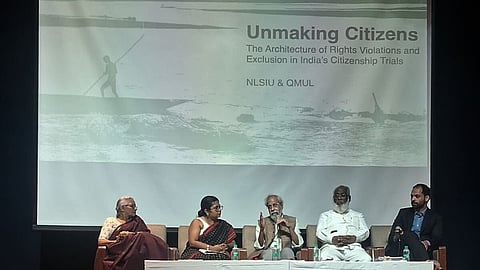

ASSAM’S FOREIGNER’S TRIBUNALS (‘FTs’)have declared over 165,000 people as “foreigners”, with more than 85,000 cases still pending and more than a million NRC appeals potentially headed to these tribunals. Behind each data point are individuals facing serious consequences as a result of the State's one hundred Foreigners Tribunals - quasi-judicial bodies that decide citizenship.
58-year-old Rahim Ali, an agricultural labourer from Assam, died in early 2022 after waiting for nearly two decades to prove he was Indian. By the time the Supreme Court eventually overturned the decision, it was too late.
A new report titled ‘Unmaking Citizens: The Architecture of Rights Violations and Exclusion in India’s Citizenship Trials’ co-published by the National Law School of India University, Bengaluru and Queen Mary University of Law, London, and authored by academic Mohsin Alam Bhat and researchers Arushi Gupta and Shardul Gopujkar provides a comprehensive legal analysis of the FT regime and an empirical account of how the FT system functions in practice. It draws on a detailed review of 1,193 Gauhati High Court orders (between 2009 and 2019), Supreme Court judgements (between 2017 and 2024), and interviews with lawyers, including nine in-depth case studies of FT cases.
The report argues that the Gauhati High Court has not merely failed to correct procedural and evidentiary flaws but has actively entrenched them. Through inconsistent rulings and selective legal reasoning, the High Court has normalised practices that turn minor documentary inconsistencies into significant determinants of citizenship status. The Report situates the FTs within a broader ecosystem that includes the police, the Home Department, the judiciary, and the legal frameworks of the Foreigners Act and the Citizenship Act.
It notes that FTs operate without a codified framework, leading to arbitrary and discretionary decisions and violation of the basic principles of natural justice. It further notes that the FT regime disproportionately impacts women and Muslims.
At the report’s launch in New Delhi last Saturday, July 26, senior researcher Dr Usha Ramanathan reflected on the foundational period of the Indian Constitution between 1947-1950, when the provisions of citizenship were inclusive and the idea of proof of citizenship did not exist. Dr. Ramanathan linked the current FT regime to the larger question of state impunity, where the burden of accountability is shifted from the State and placed entirely on its people.
Present also at the launch, retired Supreme Court judge, Justice Madan Lokur highlighted that the flaws in the FT process begin right from the initial stage of the complaint, and the entire process is riddled with violations of natural justice at every step. He further noted that considering the lack of statutory appeal, the jurisdiction of the High Court becomes limited, making it all the more critical for both the Foreigners Tribunals and the High Court to exercise extreme caution and responsibility.
R.A. Choudhary, an advocate practising at the Gauhati High Court, drew attention to the dangers of unreliable data on illegal immigration, which is often used to portray an “epidemic” of infiltration. He gave the example of Apsara Khatoon, a widowed woman who had added the word “Bewa” (widow) to her name after her husband’s death. This addition was treated as a fatal discrepancy by the FT. In another case, a difference in spelling was enough to cast doubt on a person’s identity. These examples, he said, show how minor variations in language, culture and appearance are weaponised to deny people their citizenship.
The report concludes that the FT system is not merely flawed but irreconcilable with the principles of constitutional democracy and the rule of law. “Only a fundamental rethinking of the legal and institutional frameworks governing citizenship determination can restore fairness, legality, and justice to the process”, the report states.
It further notes that the FT system “lacks a secure legal foundation, is vulnerable to executive interference, and is staffed by inadequately qualified adjudicators. It thus stands in stark violation of the rule of law and the right to an effective remedy under both domestic and international law.”